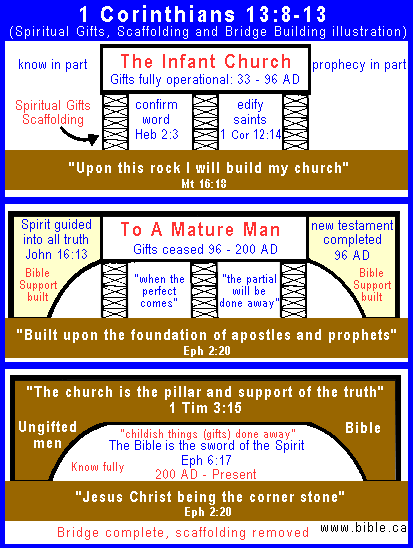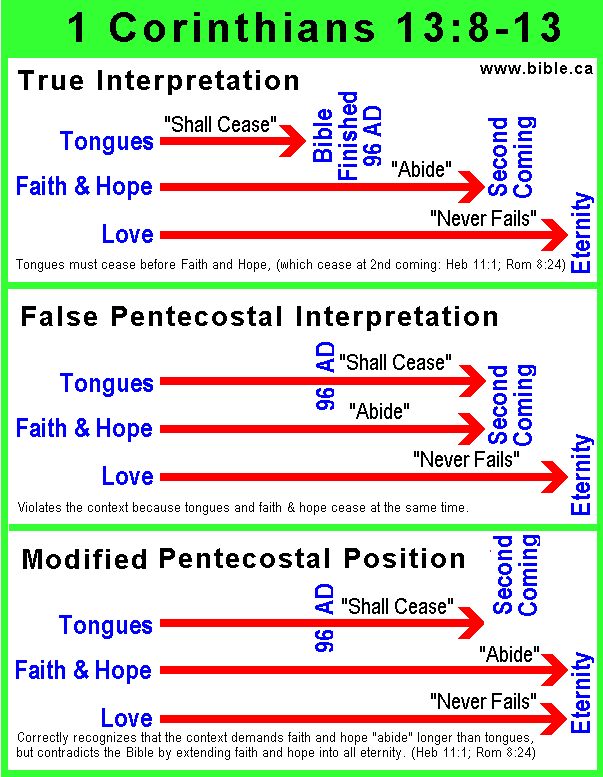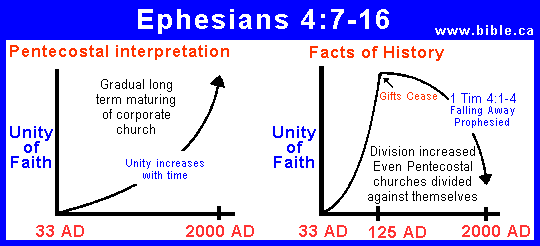|
What does the inspired Bible say? |
Cessation of
spiritual gifts Part 1: Intro and foundational arguments
|
|
|
|
Gifts cease when the "Perfect comes": 1 Cor 13:8-13
1. Truth: Gifts cease before the second coming, specifically around 100 AD
2. False view: Gifts cease at the second coming
|
|
|
Overview of understanding 1 Cor 13:8-13: Tongues ceased upon completion of canon:
1. “Proponents of the canon view argue that the gifts mentioned in 13:8, prophecy, tongues, and knowledge, all entail direct revelation from God. The three gifts in 13:8 are said to be “in part” or partial in the sense that each gives only a portion of the revelation God has intended for the church. Accordingly, that which is described as “the perfect” in 13:10 refers to the counterpart of the piecemeal revelation these gifts provide. In other words, “the perfect” refers to the full or complete body of revelation God intended for the church and preserved in the New Testament canon. As such, with the completion of the New Testament at the end of the apostolic era, and, thus, with “the perfect” having come, these gifts ceased.” (Detroit Baptist Seminary Journal, Bruce Compton, 1 Corinthians 13:8–13 and the Cessation of Miraculous Gifts, Vol 9, p99, 2004 AD)
2. “The illustration in 13:11 contrasting the activities of thinking and speaking as a child with those of an adult is generally understood by advocates as contrasting the church’s ability to communicate and understand revelation prior to and after the completion of the New Testament canon. Prior to the completion of the canon, those having these gifts communicated revelation in a limited or piecemeal fashion, and the church’s understanding of revelation was for that reason limited as well. This would correspond to the limited thinking and speaking skills of a child. Once the canon had been completed, these limitations were removed. Adulthood having arrived, the limited communicative and cognitive skills of a child were, in effect, laid aside.” (Ibid.)
3. “The analogies of seeing and knowing in 13:12 are generally understood in a similar way. To “see in a mirror dimly” is a metaphor and refers to seeing or perceiving God’s will unclearly because of limited revelation. To “see face to face,” likewise a metaphor, simply means having the lack of clarity due to limited revelation removed. The full-orbed revelation of God having been given, the church is able to see clearly and distinctly the whole counsel of God intended for this age. The same may be said of the contrast in the last half of the verse between to “know in part” and to “know fully.” With the completed New Testament canon, believers are able to know the revealed will of God fully and distinctly. It is as if they were able to know themselves as God (or others) knows them, that is, directly and clearly, unobstructed by the use of a mirror. (Ibid.)
4. “Finally, from the perspective of the canon view, the point of 13:13 is that faith, hope, and love continue throughout the present age, in contrast to the revelatory gifts which cease with the completion of the canon. Beyond this, love is said to be the greatest of these in that it will continue on into eternity. The same is not true with faith and hope. When Christ returns, faith in Christ is replaced with seeing Christ, while hope in the promises of God is replaced by the realization of those promises. Thus, 13:13 reinforces the point made at the outset of the passage in 13:8 where the apostle declares that “love never fails.” Unlike the revelatory gifts which cease with the completion of the canon, and unlike even faith and hope which cease with the return of Christ, love never ceases. (Ibid.)
Introduction:
1. The Bible clearly teaches that all 9 supernatural gifts of the Holy Spirit ceased upon the completion of the canon of the bible around AD 100.
a. Those who claim miraculous power need to prove it by performing a miracle.
b. 1 Cor 13:8-13 clearly shows that tongues ceased when the New Testament was completed.
2. If you speak in tongues, you are under self-delusion because tongues ceased around AD 100.
a. If you think your tongue speaking is the same as the true Bible miracle of tongues recorded in the Bible, you are mistaken.
b. Tongues in the Bible was a spoken human language, but tongues today is gibberish.
3. In 1 Cor 13 Paul discussed spiritual gifts from two angles.
a. V1-7 He singled out tongues, prophecy, inspired knowledge and supernatural faith (as representative of all spiritual gifts) and contrasted them with love as their superior (vs. 1-7).
i. This contrast has to do with the value of spiritual gifts.
b. V8-13 Then Paul referred to the three gifts of prophecies, tongues, and knowledge (again obviously representing all spiritual gifts) and contrasted them with the Christian virtues of faith, hope and love (vs. 8-13).
i. This contrast has to do with the duration of spiritual gifts. As long as earthly life shall last, faith, hope and love will abide (v. 13), whereas spiritual gifts were going to "cease" or be "be done away" (v. 8). The termination of the gifts would be "when that which is perfect is come" (v. 10).
4. The nouns "prophecy" and "knowledge" (vs. 2, 8) are feminine gender in the Greek.
a. But in verses 9 and 10 we have verbs, not nouns, thus requiring neuter gender modifiers. In verse 9 the verbs "know" and "prophesy" are both modified by the adverbial expression ek merous ("in part").
b. But in verse 10 those verbs and their modifiers are brought together and replaced by the single substantive expression to ek merous ("that which is in part").
c. Whatever is partial in verse 9 is "that" which is partial in verse 10. And since to teleion ("the perfect") is the counterpart to to ek rmerous ("that which is in part"), it is absolutely clear that the "perfect" also refers to those same verbs.
d. Therefore, the word "perfect" describes the completion of inspired preaching and points to the consequent cessation of the spiritual gifts which enabled and confirmed that preaching.
5. Contrasts in 1 Corinthians 13:8-13:
|
Between the "now" 56 AD |
And then "then" 96 AD |
|
Between that which fails |
And that which never fails |
|
Between that which ceases |
And that which does not cease |
|
Between the part |
And the whole |
|
Between the incomplete |
And the complete |
|
Between the childhood state |
And the state of mature manhood |
|
Between knowing only part |
And knowing fully |
|
Between seeing things darkly |
And seeing them clearly (face to face) |
6. “The Time When The “In Part” Ceases: The introductory statement, “when the perfect comes,” represents the protasis of an indefinite temporal clause. The construction is indefinite in the sense that the writer does not know precisely when “the perfect” will come, only that it is coming. The statement that follows, “the partial will be done away with,” identifies what will transpire when “the perfect” comes. In other words, the two statements in 13:10 have a cause-and-effect relationship. The partial ceases when and only when “the perfect” arrives. Assuming, as was argued, that “the perfect” refers to the completed revelation God intended for the church and preserved in the New Testament, then according to this verse the revelatory gifts ceased with the closing of the New Testament canon at the end of the apostolic era.” (Detroit Baptist Seminary Journal, Bruce Compton, 1 Corinthians 13:8–13 and the Cessation of Miraculous Gifts, Vol 9, p128, 2004 AD)
I. Paul’s Sermon: "Partial Vs Complete Knowledge"
A. Think of 1 Cor 13:8-13 as Paul's sermon outline entitled "Partial Vs Complete Knowledge" It has an introduction that states the main point, two illustrations of this main point, and a conclusion that restates the point!
|
Paul’s sermon: Partial Vs Complete Knowledge in 1 Cor 13:8-13 |
||
|
Now = part knowledge |
Then = perfect knowledge |
Result |
|
v9 Know & prophecy in part |
v10 the perfect comes |
v8-10 gifts done away |
|
v11 as a child |
v11 became a man |
v11 childish things done away |
|
v12 mirror dimly |
v12 face to face (mirror clearly) |
v13 faith, hope & love remain after gifts have ceases |
|
v12 Know in part |
v12 know fully |
|
1. Paul’s Sermon Introduction: States the main point plainly in V9-10
a. The contrast is between partial and complete KNOWLEDGE
2. Paul’s Sermon Illustrations: Uses two illustrations to explain main point:
a. FIRST: child/man v11 (see 1 Cor 14:20 gifts referred to as childish)
b. SECOND: mirror darkly/face to face V12 (polished brass mirror)
3. Paul’s Sermon Conclusion: Restates main point again plainly: V13
a. contrast is once again between partial and complete KNOWLEDGE
B. Three parallel passages:
1. Charting the three parallel passages:
|
1 Cor 12-14 |
Ephesians 4 |
Romans 12 |
|
To each one is given the manifestation of the Spirit 12:7 |
To each one grace was given according to the measure of Christ's gift v7 |
We have gifts that differ according to the grace given to us v6 |
|
The Spirit distributes to each one individually just as He wills v11 |
When He ascended on High He gave gifts to men v8 |
God has allotted to each a measure of faith v3 |
|
To one is given wisdom, knowledge, faith healings, miracles, prophecy, distinguishing of spirits, tongues, interpretation of tongues 12:8-10 |
- |
Prophecy, service, teaching, exhorting, giving, leading mercy v6-8 |
|
God has appointed in the church, first apostles, second prophets, third teachers, then miracles, then gifts of healings, helps, administrations, kinds of tongues 12:28 |
He gave some apostles, some evangelists, some pastors and teachers v11 |
- |
|
For the common good, seek to abound for the edification of the church 12:7 14:12 |
for the equipping of the saints for the work of service, to the building up of the body v12 |
- |
|
love never fails 12:1-8 |
building up of body in love v15 |
each devoted in love v 9-10 |
|
Gifts will cease ... now we know in part, then we will know fully 13:10,12 |
until we attain to the knowledge of the son of man v13 |
- |
|
When I was a child...When I became a man 13:11 |
To a mature man, not child tossed about by winds of doctrine but to grow up v13-15 |
that you may prove what the will of God is, that which is good and acceptable and perfect. v2 |
|
Now you are Christ's body and individually members of it 12:27 |
The whole body fitted according to the working of each individual part v16 |
we are one body in Christ and individually members of one another v4-5 |
2. Summary of three parallel passages:
|
Gifts Operational |
Gifts Ceased |
|
know and prophecy only a part |
know fully, perfect knowledge of Christ |
|
Children tosses about |
became a mature man |
|
look into mirror dimly |
face to face (mirror clearly) |
|
every wind of doctrine |
unity of the faith |
II. Definition of perfect (teleion) in 1 Cor 13:8-13
A. Greek Definition of perfect: "teleion"
1. The Greek word "perfect" does not denote the idea of blamelessness, perfection or complete holiness as our English word "perfect" does today.
2. Greek dictionary definitions:
a. VINE: "Signifies having reached its end, finished, complete, perfect"
b. THAYER: "brought to its end, wanting nothing necessary to completeness; when used of men it means full-grown, adult, of full age, mature."
c. BAGSTER: "brought to completion, complete, entire, as opposed to what is partial or limited"
d. ARNDT & GINGRICH: "having attained the end or purpose, complete, perfect"
B. The Gender and Meaning Of “The Perfect”:
1. “The perfect” (to teleion) is neuter in gender and refers to some thing rather than to some person. This much is certain: the perfect is not Christ. In the scriptures the term “perfect” mainly refers to “maturity” or “completeness.” Translated “fullgrown,” it describes maturity in Hebrews 5:14 where it is contrasted to “babe.” It means “complete” in James 1:4 when the writer speaks of Christians being “perfect and entire, lacking in nothing.” The context must determine its significance in the passage under study.” (Florida College Annual Lectures, L. A. Stauffer, Duration of Miracles, Great Bible Doctrines, p151, 1975 AD)
2. “The critical question raised with these verses is the meaning of the term “the perfect” (τὸ τέλειον) in 13:10. The term “the perfect” represents an articular neuter adjective functioning as a substantive and translated “the perfect” or “that which is perfect.” Much has been said about the neuter gender of the adjective and what that indicates in terms of the adjective’s antecedent. The best explanation is that the adjective gets its gender from the neuter noun forming the expression “in part” in 13:9–10. In other words, by using the neuter form of the adjective in this context, Paul signifies that whatever the “in part” refers to, “the perfect” refers to its counterpart or its antithesis. Having the adjective in the neuter gender thus links “the perfect” and the “in part” as having ultimately the same referent. Whatever the “in part” refers to, the “perfect” refers to as well. The only difference between the two expressions is the difference over the relative dimension or extent of the referent. Having answered the question about the gender and antecedent of “the perfect,” what remains is to identify the meaning of “in part” in 13:9. Since Paul declares that the gifts mentioned in 13:9 are in some way “in part,” the proper approach to identifying the meaning of the phrase is to ask what these gifts have in common that could be described as “in part.” Based on the definitions given above, the common denominator among the gifts is that they all involve direct revelation from God. As such, the expression “in part” simply refers to the fact that the revelation communicated by these gifts is partial or piecemeal. The corresponding expression “the perfect” as the counterpart to the partial must refer to the full or complete revelation, of which these gifts contribute their portion. Finally, since these gifts are specifically identified in 12:27–28 as those which God has given to the church, the body of Christ, “the perfect” represents the full or complete revelation that God intends for the church. Thus, “the perfect” points to completed revelation God has intended for the church and has preserved in the New Testament.” (Detroit Baptist Seminary Journal, Bruce Compton, 1 Corinthians 13:8–13 and the Cessation of Miraculous Gifts, Vol 9, p123, 2004 AD)
C. "Perfect" (teleios) as used in the New Testament:
1. The Greek adjective translated "perfect" (teleios) means "having attained the end or purpose, complete."'
a. It may be applied to people with the meaning of "full-grown, mature, adult" being "perfect and entire, lacking in nothing' Jas. 1:4.
b. Or it may refer to the finality of anything, something which has been "brought to its end, finished."
c. In contrast to the often-heard statement that "nothing in this world is perfect,"
2. Teleios (complete/perfect) refers to the process of our attaining spiritual perfection and maturity:
a. "Therefore you are to be perfect [teleios], as your heavenly Father is perfect." (Matthew 5:48)
b. "Jesus said to him, “If you wish to be complete [teleios], go and sell your possessions and give to the poor, and you will have treasure in heaven; and come, follow Me.”" (Matthew 19:21)
c. "Yet we do speak wisdom among those who are mature [teleios]; a wisdom, however, not of this age nor of the rulers of this age, who are passing away;" (1 Corinthians 2:6)
d. "Brethren, do not be children in your thinking; yet in evil be infants, but in your thinking be mature [teleios]." (1 Corinthians 14:20)
e. "until we all attain to the unity of the faith, and of the knowledge of the Son of God, to a mature [teleios] man, to the measure of the stature which belongs to the fullness of Christ." (Ephesians 4:13)
f. "Let us therefore, as many as are perfect [teleios], have this attitude; and if in anything you have a different attitude, God will reveal that also to you;" (Philippians 3:15)
g. "We proclaim Him, admonishing every man and teaching every man with all wisdom, so that we may present every man complete [teleios] in Christ." (Colossians 1:28)
h. "Epaphras, who is one of your number, a bondslave of Jesus Christ, sends you his greetings, always laboring earnestly for you in his prayers, that you may stand perfect [teleios] and fully assured in all the will of God." (Colossians 4:12)
i. "But solid food is for the mature [teleios], who because of practice have their senses trained to discern good and evil." (Hebrews 5:14)
j. "And let endurance have its perfect result, so that you may be perfect [teleios] and complete, lacking in nothing." (James 1:4)
k. "For we all stumble in many ways. If anyone does not stumble in what he says, he is a perfect [teleios] man, able to bridle the whole body as well." (James 3:2)
l. "There is no fear in love; but perfect love casts out fear, because fear involves punishment, and the one who fears is not perfected [teleios] in love." (1 John 4:18)
3. Teleios (complete/perfect) refers to the true heavenly tabernacle:
a. "But when Christ appeared as a high priest of the good things to come, He entered through the greater and more perfect [teleios] tabernacle, not made with hands, that is to say, not of this creation;" (Hebrews 9:11)
4. Teleios (complete/perfect) refers to God’s gifts:
a. "Every good thing given and every perfect [teleios] gift is from above, coming down from the Father of lights, with whom there is no variation or shifting shadow." (James 1:17)
5. Teleios (complete/perfect) refers to the word of God:
a. "but when the perfect [teleios] comes, the partial will be done away." (1 Corinthians 13:10)
b. "And do not be conformed to this world, but be transformed by the renewing of your mind, so that you may prove what the will of God is, that which is good and acceptable and perfect [teleios]." (Romans 12:2)
c. "But one who looks intently at the perfect [teleios] law, the law of liberty, and abides by it, not having become a forgetful hearer but an effectual doer, this man will be blessed in what he does." (James 1:25)
D. Definition of perfect (teleios) in 1 Cor 13:8-13: “completed process”
1. Two different views of what perfect refers to:
|
Gifts cease before the second coming (Truth) |
Gifts cease at the second coming (False views) |
|
The "perfect comes" refers to: 1. "perfect knowledge", the completion of the God's revelation (canon) 2. the corporate maturity of the church brought about by the completion of God's revelation (canon) |
The "perfect comes" DOESN’T refer to: 1. The perfect "Jesus Christ" when he comes again. 2. The "corporate maturity" of the church at second coming. 3. The "individual perfection" of the believer at death. 4. The "eschatological perfection" brought about by the second coming of Christ and the eternal state of heaven. |
2. The truth is that the perfect comes, refers specifically to the completion of the full revelation of the New Covenant to man.
a. The church exists in an immature corporate, collective state until this revelation is complete, at which point gifts are no longer needed and the church is fully mature.
3. “Perfect” refers to the completion of the revelation of the Gospel. (canon)
a. What is the perfect?
b. Whatever is contrasted "in part".
c. "Perfect" is a generic verb that could refer to 1000's of things.
d. In order to know what noun perfect modifies, we must use the context to determine this.
4. Let the context tell us what is in part and what is complete (perfect):
|
True method of interpretation: |
|
|
What is in part: |
What is perfect: |
|
Partially full glass |
completely full glass |
|
Partially full gas tank |
completely full gas tank |
|
Partially full knowledge |
completely full knowledge |
|
Pentecostal method of interpretation: |
|
|
What is in part: |
What is perfect: |
|
Partially full glass |
Jesus is sinless |
|
Partially full gas tank |
Jesus is sinless |
|
Partially full knowledge |
Jesus is sinless |
|
Partially full knowledge |
Jesus is sinless |
|
The object noun MUST BE THE SAME!!! 1. Two times we are specifically told by the Holy Spirit that "knowledge, know, knowing" is the "object noun" of "Perfect" 2. "We know in part" we only know part of the truth 3. "But when the perfect comes" then we will know all of God's will for us. |
|
5. Perfect vs. complete knowledge not Christ or the second coming
|
Tongues ceased when perfect knowledge comes: |
||
|
|
Knowledge in part |
Knowledge is complete |
|
V10 |
For we know in part, and we prophesy in part |
but when the perfect comes |
|
V12 |
now I know in part |
but then I shall know fully |
6. The Pentecostal/Charismatic interpretation that the “perfect coming” is “Jesus” or the “second coming” violates the context of the passage and is therefore wrong.
7. All Spiritual gifts ceased when their purpose expired:
a. The church reaches corporate maturity since it has a compete written law of Christ.
b. We have the Bible and don’t need them any more.
III. Gifts cease when church reaches corporate maturity when the Bible is complete
A. Paul’s two illustrations prove spiritual gifts ceased when the Bible was completed:
1. Paul employs the first of two illustrations to the main point, where he contrasts being a child, (with spiritual gifts) were being a man (knowledge compete no spiritual gifts needed)
2. Refers to the completion of the Bible which will bring about maturity of the corporate church.
|
Corporate maturity illustration in 1 Cor 13:11 |
|
|
Child |
During the age of spiritual gifts when revelation of incomplete and the Bible was not fully written. |
|
Man |
Revelation complete, Bible finished in 96 AD. Gifts ceasing is equated directly with a man doing away with childish things. |
3. Two parallel passages that teach the identical thing:
|
1 Cor 13:11 |
Eph 4:13 |
|
"When I was a child, I used to speak as a child, think as a child, reason as a child; when I became a man, I did away with childish things." |
"until we all attain to the unity of the faith, and of the knowledge of the Son of God, to a mature man, to the measure of the stature which belongs to the fullness of Christ." |
|
Notice that both 1 Cor 13 and Eph 4 equate attaining fullness of knowledge with becoming a mature man. |
|
B. Spiritual gifts were the scaffolding that supported the infant church:
1. In the picture we have three stages of building a highway over pass (bridge).
a. Stage #1: Scaffolding (spiritual gifts) put up and structure built on top (church)
b. Stage #2: Permanent side supports are built (word of God) while scaffolding (gifts) are still in place.
c. Stage #3: When the side supports are compete (bible finished in 96 AD) the scaffolding is removed, no longer needed for anything. Now the Word of God supplies everything that the gifts were purposed to do! We have a miracle confirmed message designed to edify the church!
2. Spiritual gifts revealed the pattern of doctrine and morality
- Eph 4:14 The purpose of gifts and ultimately the Bible was, "as a result let us not be tossed about by every wind of doctrine"
- Gifts did restrain false doctrine in the let century: 2 Th 2:6,7
3. When the HS withdrew gifts from the church, what was left was:
- the "sword of the Spirit" Eph 6:17
- "the power of God for salvation" Rom 1:16; 1 Cor 1:18; Jas 1:21
- a book which fully furnishes: 2 Ti 3:16,17
- Have all truth in written form: Jn 16:13 + 2 Pe 1:3
IV. Tongues will cease before the second coming:
A. The very context of 1 Co 13:8-13 proves that gifts must cease prior to the second coming!!!
1. Faith Heb 11:1: "Now faith is the assurance of things hoped for, the conviction of things not seen."
a. Faith looks forward to future fulfillment.
b. It is "the assurance of things hoped for, a conviction of things not seen" (Heb. 11:1).
c. While we live in this world, "we walk by faith, not by sight" (1 Cor 5:7).
d. Faith is a characteristic of this age. It is "unto the saving of the soul" (Heb 10:39).
2. Hope Rom 8:24: "For in hope we have been saved, but hope that is seen is not hope; for why does one also hope for what he sees? But if we hope for what we do not see, with perseverance we wait eagerly for it."
a. Hope is limited to earthly existence.
b. It involves steadfastness (Rom. 15:4), waiting (Gal. 5:5), expectation (Phil. 1:20), looking (Tit. 2:13) and laying hold (Heb. 6:18) "unto the end" (Heb. 3:6; 6:11).
c. But hope will not exist in heaven because," hope that is seen is not hope" (Rom. 8:24).
d. So now "we hope for that which see not" (v. 25).
3. “Paul is saying that the three virtues continue “now,” that is, “in the present” or “in this present period.” … Paul is contrasting the virtues with the revelatory gifts. The virtues are superior because they are longer lived than the gifts. In this case, however, the contrast is between the gifts that cease at some point within this present period and the virtues that continue throughout this period. Paul then concludes by declaring the superiority of love to the other virtues. Love is superior, the implication is, because it alone continues beyond the present period into eternity.” (Detroit Baptist Seminary Journal, Bruce Compton, 1 Corinthians 13:8–13 and the Cessation of Miraculous Gifts, Vol 9, p144, 2004 AD)
4. Conclusion: Spiritual gifts cease before the second coming.
a. Spiritual gifts cease before Faith and hope.
b. Faith and hope cease at the second coming.
c. Spiritual gifts cease before the second coming.
C. Supernaturally endowed knowledge passes away not knowledge in general:
1. One of the most common and superficial objections made by modern tongue speakers, is that knowledge did not cease when the Bible was completed. This naive and poorly thought out position is defeated when it is pointed out that “knowledge” was one of the nine listed spiritual gifts of the Holy Spirit in 1 Cor 12.
2. “Knowledge. Placed in a series with “prophecies” and “tongues,” “knowledge” in 13:8 must refer to the spiritual gift Paul lists in 12:8 as a “word of knowledge.” As such, the gift in 13:8 needs to be distinguished from the knowledge that every believer has through the illuminating work of the Spirit. By context, Paul is referring specifically to the spiritual gift given to some believers, but not to all. As with the other gifts in 13:8, the debate is over the accuracy and authority associated with this gift. There is general agreement that the gift is, in some sense, revelatory. Two key texts are helpful in this debate, 1 Corinthians 13:2 and 14:6. In these passages, “knowledge” is juxtaposed either with “prophecy” and “revelation” or with “prophecy” and “mysteries,” suggesting not only a common revelatory link, but also a common basis of accuracy and authority. The evidence is indirect, but consistent with the force of the other two gifts as communicating direct revelation that is inerrant and divinely authoritative.” (Detroit Baptist Seminary Journal, Bruce Compton, 1 Corinthians 13:8–13 and the Cessation of Miraculous Gifts, Vol 9, p119, 2004 AD)
C. The Great contrast between that which ceases and that which remains:
|
Tongues cease before faith/hope cease, but love never ceases: |
|
|
Tongues cease before faith hope and love |
"Tongues will cease" 1 Cor 13:8 |
|
Faith and Hope outlive tongues Faith and Hope cease at second coming |
"Faith & hope abide" 1 Cor 13:13 till second coming Heb 11:1; Rom 8:24 |
|
Love outlives Faith, hope & tongues. Love never ceases |
Love never fails 1 Cor 13:8, the greatest of these is love because it never ceases! |
1. The contrast has to do with the temporary and the permanent during the Christian age.
a. Spiritual gifts were to be abolished whereas faith, hope and love continue to the end.
b. Finally, love alone of the three qualities goes on into eternity, "God is love" (I John 4:16) and "love never fails" (1 Cor 13:8).
c. Nothing, including death, "shall be able to separate us from the love of God which is in Christ Jesus our Lord" (Rom. 8:39).
2. Faith and Hope must outlive Tongues:
|
True interpretation of 1 Cor 13:8-13 |
|
Tongues --------------> cease (96 AD) Faith & Hope ----------------------------------->abide till 2nd coming Love never fails -------------------------------------------------------------------->eternity Faith and hope MUST abide longer than tongues. Faith and hope cease at second coming: Heb 11:1; Rom 8:24. Tongues must cease sometime prior to second coming! |
|
Standard Pentecostal false interpretation |
|
Tongues -----------------------------------------> cease at 2nd coming Faith & Hope -----------------------------------> abide till 2nd coming Love never fails -------------------------------------------------------------------->eternity Violates the context because tongues, faith and hope cease at the same time |
|
Modified Pentecostal false interpretation |
|
Tongues -----------------------------------------> shall cease (96 AD) Faith & Hope ----------------------------------------------------------------------->abide forever Love never fails -------------------------------------------------------------------->eternity Once Pentecostals are forced into correctly recognizing that the context demands that faith and hope outlive tongues, they then adopts an unbiblical definition of faith and hope by extending them into all eternity. |
|
|
3. Tongues must cease before Faith and Hope, which will cease at the second coming:
D. False Pentecostal position:
1. 1 Cor 13: 8-13 teach a “corporate maturing process” of the church which ended around AD 100 but Charismatics continue the growth process until the second coming:
a. Actual quote from Pentecostal doctrine book: "1 Cor 13 & Eph 4 both speak of the church corporately growing into full manhood, which is a progressive, continuing and future fact"
b. This Pentecostal interpretation states that as time goes on, the church would become more mature, more Christ like and have a fuller understanding of doctrinal things and have an increased "unity of faith".
c. All these things increase gradually over time till the second coming.
2. To refute this view, we merely point out that:
a. The facts of history show there was only one church in the first century that was unified on doctrine and there are thousands of churches today!
b. That a falling away was prophesied in 1 Tim 4:1-4.
c. That such a falling away has occurred with the result that there are many denominations today, each teaching differing doctrine.
d. Even though Pentecostal churches represent a tiny fraction of denominations today, even they are highly divided over doctrine and fellowship disputes.
e. On what basis would Pentecostals suggest that the church has grown into manhood gradually over time? We welcome their suggestions!
Conclusion:
1. Three reasons tongues have ceased:
a. No longer any need for gifts:
i. Apostles have been led into all truth: Jn 16:13 + Jude 3
ii. The Bible has been written and confirmed to be inspired
b. Gifts ceased with apostolic age being transmitted by an apostle's hands
c. Gifts were a temporary; "scaffolding" till the church fully established once it had the Bible.
2. Rom 10:1-3 Pentecostals today who claim to speak in tongues, are zealous but not according to knowledge or truth.
a. 2 Ti 2:25,26 May they come to their senses and escape the Devils snare
3. For those today who claim to attend a miraculously “Spirit filled church” we offer this advice:
a. “Show me”: Apostle Paul told fakes and frauds who claim supernatural power to “show me the power not the words”. Today’s Charismatics and Pentecostals are fakes and frauds who need to stop merely claiming power but proving it just like Paul said. Until then SHUT UP, for you are under direct condemnation of God for claiming to be “Spirit filled” or a prophet when you are not. Paul warned Charismatics and Pentecostals today to STOP BEING ARROGANT with their bold words and claims but can never perform a single miracle:
i. "Now some have become arrogant, as though I were not coming to you. But I will come to you soon, if the Lord wills, and I shall find out, not the words of those who are arrogant but their power." (1 Corinthians 4:18–19)
ii. "I was with you in weakness and in fear and in much trembling, and my message and my preaching were not in persuasive words of wisdom, but in demonstration of the Spirit and of power, so that your faith would not rest on the wisdom of men, but on the power of God." (1 Corinthians 2:3–5)
b. Stop deluding yourself. You have never seen a single miracle performed in your “Spirit filled church”. Constant claims of supernatural power by your preacher or members in the audience are mere words. Smacking someone on the head who falls backwards into the waiting hands of a “catcher” is not a miracle because anyone can do it. Speaking in tongues as gibberish (conveniently never a human language but always called a heavenly language so it is alwys “unconfirmable”) is not a miracle because many occult non-Christian world religions also “speak in tongues [gibberish]” in exactly the same way.
c. Read 1 Cor 13:8-13.
Holy Spirit outlines:
By Steve Rudd: Contact the author for comments, input or corrections.












